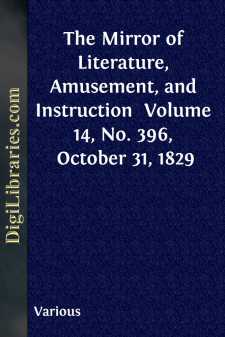Categories
- Antiques & Collectibles 13
- Architecture 36
- Art 48
- Bibles 22
- Biography & Autobiography 813
- Body, Mind & Spirit 142
- Business & Economics 28
- Children's Books 15
- Children's Fiction 12
- Computers 4
- Cooking 94
- Crafts & Hobbies 4
- Drama 346
- Education 46
- Family & Relationships 57
- Fiction 11829
- Games 19
- Gardening 17
- Health & Fitness 34
- History 1377
- House & Home 1
- Humor 147
- Juvenile Fiction 1873
- Juvenile Nonfiction 202
- Language Arts & Disciplines 88
- Law 16
- Literary Collections 686
- Literary Criticism 179
- Mathematics 13
- Medical 41
- Music 40
- Nature 179
- Non-Classifiable 1768
- Performing Arts 7
- Periodicals 1453
- Philosophy 64
- Photography 2
- Poetry 896
- Political Science 203
- Psychology 42
- Reference 154
- Religion 513
- Science 126
- Self-Help 84
- Social Science 81
- Sports & Recreation 34
- Study Aids 3
- Technology & Engineering 59
- Transportation 23
- Travel 463
- True Crime 29
The Mirror of Literature, Amusement, and Instruction Volume 14, No. 396, October 31, 1829
by: Various
Categories:
Description:
Excerpt
BLARNEY CASTLE.
This Engraving, to use a cant phrase, is an exquisite "bit of Blarney;" but independent of the vulgar association, it has a multitude of attractions for every reader. Its interest will, however, be materially enhanced by the following admirable description from the graphic pen of T. Crofton Croker, Esq.
Blarney, so famous in Irish song and story, is situated about four miles north west of Cork, and was, within these few years, a thriving manufacturing village; but it no longer wears the aspect of comfort or of business, and appears much gone to decay.
The alteration struck me very forcibly. In 1815, I remember a large square of neat cottages, and the area, a green shaded by fine old trees. Most of the cottages are now roofless; the trees have been cut down, and on my last visit, in 1821, a crop of barley was ripening in the square.
"the clam'rous rooks
Ask for their wonted seat, but ask in vain!
Their ancient home is level'd with the earth,
Never to wave again its leafy head,
Or yield a covert to the feather'd choir,
Who now, with broken song, remote and shy,
Seek other bowers, their native branches gone!"
This prepared me to expect a similar change in the grounds of the castle, where much timber has been also felled; but the grounds still are beautiful, rock and water being features in the landscape, the picturesque effect of which neglect cannot injure.
The castle consists of a massive square tower, that rises broad and boldly above surrounding trees, on a precipitous rock over a stream called the Awmartin; and attached to the east side is an extensive dwelling-house, erected about a century since by Sir James Jeffreys, who purchased or obtained this estate from the crown, and in whose family it still continues.
Blarney Castle was built about the middle of the fifteenth century, by Cormac MacCarty, or Carthy surnamed Laider, or the Strong. He was descended from the kings of Cork, and was esteemed so powerful a chieftain that the English settlers in his part of Munster paid him an annual tribute of forty pounds to protect them from the attacks and insults of the Irish. To him is also ascribed the building of the Abbey and Castle of Kilcrea, the Nunnery of Ballyvacadine, and many other religious houses; in the former of which he was buried. It would be a matter of little importance and considerable labour to trace the Castle of Blarney from one possessor to another. The genealogical table in Keating's "History of Ireland" will enable those addicted to research to follow the Mac Carty pedigree; but a tiresome repetition of names, occasioned by the scantiness of them in an exceedingly numerous family, present continual causes of perplexity to the general reader. The names of Donough, Cormac, Teague, Florence, Dermot, Owen, and Donnel, constitute almost the whole catalogue used by the Mac Carties for a period exceeding six hundred years. This difficulty is heightened from the entire Sept being, in point of fact, without a sirname, as the followers of most chieftains in Ireland as well as Scotland assumed that of their lord....












